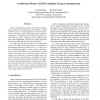Free Online Productivity Tools
i2Speak
i2Symbol
i2OCR
iTex2Img
iWeb2Print
iWeb2Shot
i2Type
iPdf2Split
iPdf2Merge
i2Bopomofo
i2Arabic
i2Style
i2Image
i2PDF
iLatex2Rtf
Sci2ools
110
click to vote
NCA
2005
IEEE
2005
IEEE
Architectural Issues of JMS Compliant Group Communication
Group communication provides one-to-many communication primitives that simplify the development of highly available services. Despite advances in research and numerous prototypes, group communication stays confined to small niches. To facilitate the acceptance of group communication by a larger community, a new specification and API, called JMSGroups, based on the popular Java Message Service (JMS) has previously been presented. As a follow-up, this paper focuses on the architectural issues of the JMSGroups implementation. We consider an implementation based on a JMS server, i.e., a JMS server that is modified internally to provide a group communication service. Usually JMS server is implemented as a single entity providing its service to numerous clients. However, single server architecture is exposed to failures and is not suitable for group communication. To address this problem, we discuss the issues related to the JMS server replication (first without providing group communic...
Related Content
| Added | 25 Jun 2010 |
| Updated | 25 Jun 2010 |
| Type | Conference |
| Year | 2005 |
| Where | NCA |
| Authors | Arnas Kupsys, Richard Ekwall |
Comments (0)

